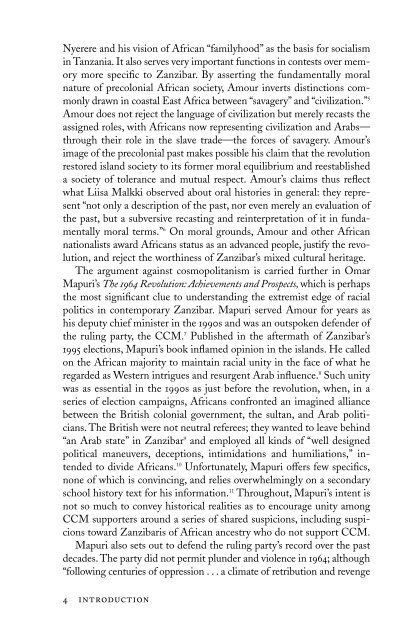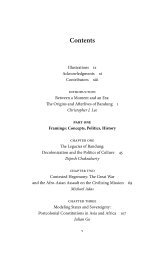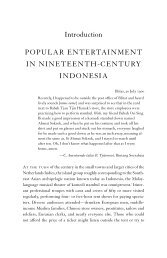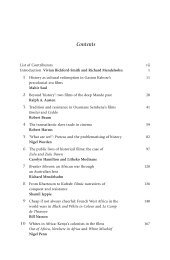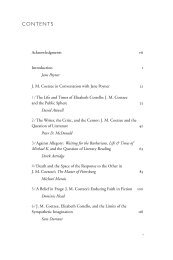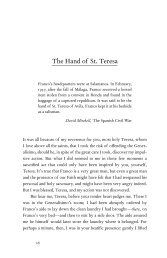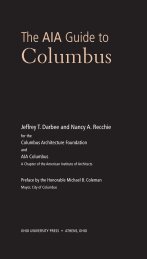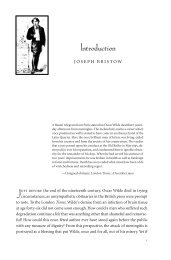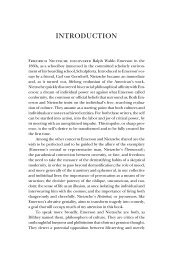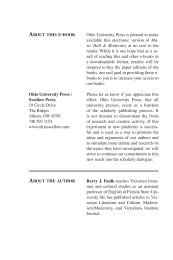Race, Revolution, and the Struggle for Human Rights in Zanzibar ...
Race, Revolution, and the Struggle for Human Rights in Zanzibar ...
Race, Revolution, and the Struggle for Human Rights in Zanzibar ...
Create successful ePaper yourself
Turn your PDF publications into a flip-book with our unique Google optimized e-Paper software.
Nyerere <strong>and</strong> his vision of African “familyhood” as <strong>the</strong> basis <strong>for</strong> socialism<br />
<strong>in</strong> Tanzania. It also serves very important functions <strong>in</strong> contests over memory<br />
more specific to <strong>Zanzibar</strong>. By assert<strong>in</strong>g <strong>the</strong> fundamentally moral<br />
nature of precolonial African society, Amour <strong>in</strong>verts dist<strong>in</strong>ctions commonly<br />
drawn <strong>in</strong> coastal East Africa between “savagery” <strong>and</strong> “civilization.” 5<br />
Amour does not reject <strong>the</strong> language of civilization but merely recasts <strong>the</strong><br />
assigned roles, with Africans now represent<strong>in</strong>g civilization <strong>and</strong> Arabs—<br />
through <strong>the</strong>ir role <strong>in</strong> <strong>the</strong> slave trade—<strong>the</strong> <strong>for</strong>ces of savagery. Amour’s<br />
image of <strong>the</strong> precolonial past makes possible his claim that <strong>the</strong> revolution<br />
restored isl<strong>and</strong> society to its <strong>for</strong>mer moral equilibrium <strong>and</strong> reestablished<br />
a society of tolerance <strong>and</strong> mutual respect. Amour’s claims thus reflect<br />
what Liisa Malkki observed about oral histories <strong>in</strong> general: <strong>the</strong>y represent<br />
“not only a description of <strong>the</strong> past, nor even merely an evaluation of<br />
<strong>the</strong> past, but a subversive recast<strong>in</strong>g <strong>and</strong> re<strong>in</strong>terpretation of it <strong>in</strong> fundamentally<br />
moral terms.” 6 On moral grounds, Amour <strong>and</strong> o<strong>the</strong>r African<br />
nationalists award Africans status as an advanced people, justify <strong>the</strong> revolution,<br />
<strong>and</strong> reject <strong>the</strong> worth<strong>in</strong>ess of <strong>Zanzibar</strong>’s mixed cultural heritage.<br />
The argument aga<strong>in</strong>st cosmopolitanism is carried fur<strong>the</strong>r <strong>in</strong> Omar<br />
Mapuri’s The 1964 <strong>Revolution</strong>: Achievements <strong>and</strong> Prospects, which is perhaps<br />
<strong>the</strong> most significant clue to underst<strong>and</strong><strong>in</strong>g <strong>the</strong> extremist edge of racial<br />
politics <strong>in</strong> contemporary <strong>Zanzibar</strong>. Mapuri served Amour <strong>for</strong> years as<br />
his deputy chief m<strong>in</strong>ister <strong>in</strong> <strong>the</strong> 1990s <strong>and</strong> was an outspoken defender of<br />
<strong>the</strong> rul<strong>in</strong>g party, <strong>the</strong> CCM. 7 Published <strong>in</strong> <strong>the</strong> aftermath of <strong>Zanzibar</strong>’s<br />
1995 elections, Mapuri’s book <strong>in</strong>flamed op<strong>in</strong>ion <strong>in</strong> <strong>the</strong> isl<strong>and</strong>s. He called<br />
on <strong>the</strong> African majority to ma<strong>in</strong>ta<strong>in</strong> racial unity <strong>in</strong> <strong>the</strong> face of what he<br />
regarded as Western <strong>in</strong>trigues <strong>and</strong> resurgent Arab <strong>in</strong>fluence. 8 Such unity<br />
was as essential <strong>in</strong> <strong>the</strong> 1990s as just be<strong>for</strong>e <strong>the</strong> revolution, when, <strong>in</strong> a<br />
series of election campaigns, Africans confronted an imag<strong>in</strong>ed alliance<br />
between <strong>the</strong> British colonial government, <strong>the</strong> sultan, <strong>and</strong> Arab politicians.<br />
The British were not neutral referees; <strong>the</strong>y wanted to leave beh<strong>in</strong>d<br />
“an Arab state” <strong>in</strong> <strong>Zanzibar</strong> 9 <strong>and</strong> employed all k<strong>in</strong>ds of “well designed<br />
political maneuvers, deceptions, <strong>in</strong>timidations <strong>and</strong> humiliations,” <strong>in</strong>tended<br />
to divide Africans. 10 Un<strong>for</strong>tunately, Mapuri offers few specifics,<br />
none of which is conv<strong>in</strong>c<strong>in</strong>g, <strong>and</strong> relies overwhelm<strong>in</strong>gly on a secondary<br />
school history text <strong>for</strong> his <strong>in</strong><strong>for</strong>mation. 11 Throughout, Mapuri’s <strong>in</strong>tent is<br />
not so much to convey historical realities as to encourage unity among<br />
CCM supporters around a series of shared suspicions, <strong>in</strong>clud<strong>in</strong>g suspicions<br />
toward <strong>Zanzibar</strong>is of African ancestry who do not support CCM.<br />
Mapuri also sets out to defend <strong>the</strong> rul<strong>in</strong>g party’s record over <strong>the</strong> past<br />
decades. The party did not permit plunder <strong>and</strong> violence <strong>in</strong> 1964; although<br />
“follow<strong>in</strong>g centuries of oppression . . . a climate of retribution <strong>and</strong> revenge<br />
4 <strong>in</strong>troduction


